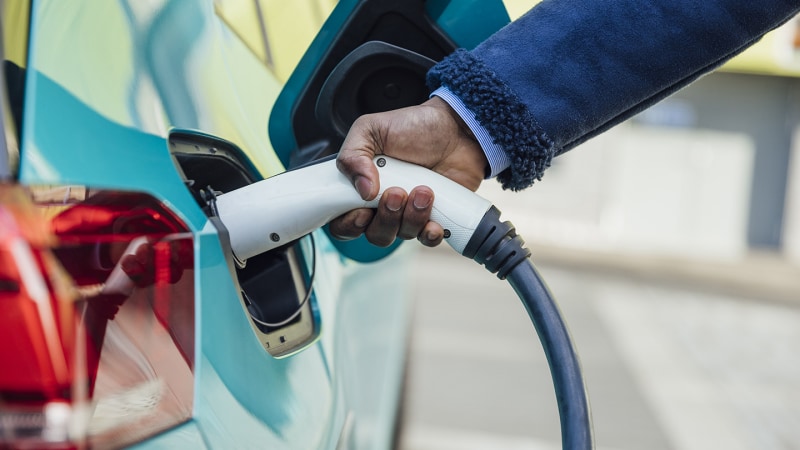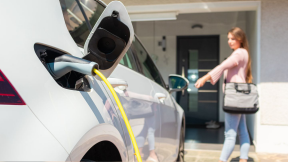What you need to know about EV battery disposal

Quick insights
- Electric vehicle (EV) batteries can be recycled to reclaim valuable materials like lithium and cobalt.
- Disposing of an EV battery typically incurs costs related to transportation and processing.
- Repurposed EV batteries can find a second life and help defray costs for vehicle owners.
Electric vehicle (EV) batteries are more than just power sources; they also hold potential value for recycling and repurposing opportunities. Like an automotive phoenix, an EV battery can rise from the ashes of its former life to serve a variety of other functions. However, it's important to remember that these batteries are not suitable for regular trash disposal and must undergo a specific recycling process to ensure legal compliance and environmental safety.
Are electric vehicle batteries recyclable?
Yes, EV batteries are indeed recyclable. This is one of the many reasons why a person may want to purchase an EV, due to its environmentally friendly features. The batteries contain valuable materials such as lithium, cobalt and nickel, all of which can be recovered and reused. Recycling these batteries helps reduce environmental waste and conserves natural resources.
How are EV batteries recycled?
Currently, specialized facilities undertake the EV battery recycling process in an effort to improve the efficiency and effectiveness of material recovery. Once the batteries reach these specialized facilities, they undergo a detailed disassembly process. Although the plastic components are frequently unsuitable for recycling, the metals within the battery are typically salvageable and reusable. This includes common metals such as aluminum, steel and copper, as well as rare metals like lithium, cobalt and nickel.
The recycling process involves several steps:
- Collection: Batteries are gathered from various collection points, ensuring they are handled safely and prepared for the next stages of recycling.
- Transportation: The collected batteries are transported to recycling facilities, adhering to safety regulations to prevent any hazards during transit.
- Manual disassembly: At the facility, batteries are carefully dismantled manually to separate different components and materials.
- Chemical treatment: This step involves using chemical processes to extract and recover precious metals, such as lithium, cobalt and nickel.
Recycling these materials not only conserves resources but also reduces the ecological impact associated with extracting new raw materials, making the production of EV batteries more cost-effective.
EV battery disposal costs
Understanding the financial aspects of EV battery disposal can be helpful for both current and prospective EV owners. Disposal costs can range from under $500 to more than $2,000, depending on factors such as the battery's type, size and the specific technologies required for processing. Below are some insights into the other factors that may impact the total costs associated with EV battery disposal:
- Transportation and processing fees: These are the primary expenses in the disposal of EV batteries. The logistics involved in safely transporting and processing these batteries can contribute significantly to the overall cost.
- Subsidies and incentives: Some states offer financial incentives to offset disposal costs, promoting environmentally responsible practices. For example, California provides rebates and tax incentives for EV owners to support battery recycling and safe disposal.
- Extended warranties and disposal costs: It's important to check if an EV's extended warranty covers battery disposal costs. While some manufacturers include this, others may not, leaving the owner responsible for the expense.
- Long-term financial planning: EV owners may want to consider these potential expenses when planning long-term vehicle costs. Incorporating disposal costs into financial planning can help prevent unexpected financial burdens.
Despite the costs, proper disposal of EV batteries is crucial. Improper disposal can lead to environmental harm, such as soil and water contamination from toxic substances. Responsible disposal ensures that hazardous materials are safely managed and recycled.
Can EV batteries be repurposed?
Yes, EV batteries can be repurposed, significantly extending their lifecycle. The process involves assessing the battery's health, ensuring it meets the technical requirements for energy storage, and integrating it into new systems, including those that are not affiliated with the automotive industry. For example, repurposed EV batteries can be used to store solar energy for residential homes or provide backup power for data centers.
Overall, repurposing an EV battery can be a financially savvy decision that can potentially save you money while helping to protect the environment. Owners who want to repurpose their used EV battery should consider researching companies that specialize in that service. By understanding the terms of sale, the expected price and the reputation of the company, EV owners can make more informed decisions about their options for disposing of their used batteries. While there are challenges to repurposing these batteries, such as ensuring long-term reliability and safety, the potential environmental and economic benefits drive ongoing innovation in this area.
Additional considerations for EV owners
EV owners should familiarize themselves with their vehicle's battery warranty and understand the terms for replacement. Regular maintenance can significantly extend a battery's life and efficiency, which can help optimize the vehicle's performance and resale value. As battery technology continues to evolve, staying informed about new developments and disposal practices may become increasingly important for making environmentally responsible decisions.
The bottom line
EV battery disposal is an important part of an EV’s lifecycle. Recycling EV batteries helps conserve materials like lithium and cobalt, which may help reduce the environmental footprint and demand for new raw materials. Meanwhile, repurposing old EV batteries for secondary uses, such as energy storage, not only extends their useful life but can also offer financial perks. Understanding how the disposal process works can help EV owners make informed, responsible decisions regarding their vehicle's battery.



